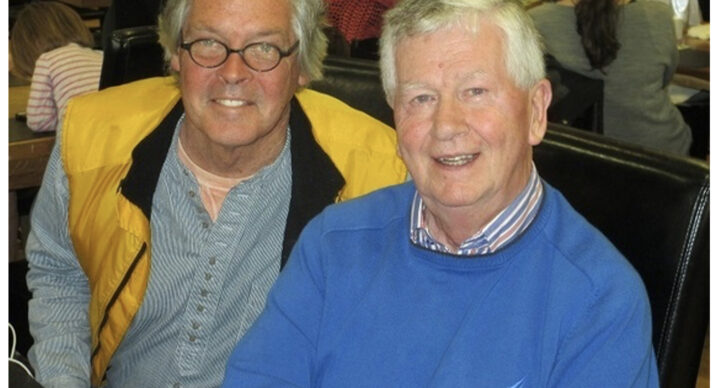As you cross the Sagamore Bridge over the Cape Cod Canal, heading to the mainland, the view to the starboard is startling in its natural beauty, its expanse of sapphire shoreline, and soul-searching mood for deep reflection. On an incoming ocean tide, the roiling waters of the canal spill out into Cape Cod Bay with the force of a rip, rushing to a horizon where water flushes up against the sky. At the crest of the bridge, with 135 feet of the ship’s clearance below, you can see a swath of blue for miles.
The 17.4-mile canal was the revelation of Pilgrim Miles Standish, who in 1623, explored this low-lying stretch of land between the Manomet and Scusset rivers in search of a trading route that would forever isolate the Cape from the rest of Massachusetts, in both geography and in spirit. Negotiating the Sagamore Bridge and its sibling, the Bourne Bridge, is symbolic to the locals: a route on-Cape and off-Cape, a passageway to different states of mind. Coming or going, the bridge provides a pause for reflection about what draws one so closely to this fragile spit of sand—a possession that began in me as a young boy in the early ’50s and has gripped me since.
Heading off-Cape toward Boston one Thursday years ago in my sun-bleached, yellow Jeep with my wife Mary Catherine in the passenger seat was a particularly potent time of a weighing up of life—a moment, I considered, of fleeting independence as we made our way to a life-altering appointment with a neurologist, a specialist in the care of Alzheimer’s disease, which has taken several family members over the years. I looked to the starboard from the peak of the bridge, as I usually do, but staring this time through the empty expression of my wife. Her focus, like a faithful mariner, was due north, just getting there. The morning was brilliant, on the lip of the ceremonial July 4th weekend, the ritual start of the Cape and Islands “season.” In less than 24 hours, miles of campers, SUVs, and Beamers would be queued up in traffic for a summer fix, but on this otherwise bracing day, all the buzz of the solstice was lost on me. Fixed in deep thought, a carousel of images plowed through my head.
I began to think about the unsettling memory loss over the last few years: the loss of self and place; the piss-poor judgment; a wholesale loss of filter; the visual impairments; the incontinence, often after performing like a puppet genius before clients; the mental numbness; a complete loss of self-esteem; and the agitation of clinical depression that began as a boy. I thought about that horrifying dislocation months ago while Christmas shopping with my son Conor in a Providence mall, not knowing for a half hour where I was or who I was. I thought about that serious head injury years ago that doctors say likely accelerated the dementia symptoms, and about my recent diagnosis of prostate cancer—another medical hand-me-down most likely from my parents. I thought about the rage I felt within.
“So, what’s next?” my wife asked.
As if I knew…
In the back seat, there were some partial answers, but not the kind built on hope.
“Thanks for your kind referral of Mr. O’Brien,” Clinical Neuropsychologist Gerald Elovitz of The Memory Center wrote just days earlier to my personal physician. “I know from him that you spent much time discussing his cognitive changes, and the test results here show that they are real.”
Elovitz, who years earlier had diagnosed my late mother with Alzheimer’s disease, went on to reference awaited test results of a brain SPECT scan that my neurologist was about to disclose to me and my wife.
“Mr. O’Brien is younger than ninety-eight percent of the mean norm group age [for dementia], so his below average performance is very problematic … [His] results fell within the range of cognitive impairment … His seriously impaired score indicates a significant cognitive deficit in learning capacity for new information, and he needed cues on more than half of the test items to obtain the score. General function levels fell in the very poor general function consistent with dementia. Mr. O’Brien’s very high agitation level merits concern. The findings here reveal short-term memory function within the first-stage dementia range.”
The SPECT scan result was a denouement: “Early Onset Alzheimer’s Disease,” my neurologist, Dr. Donald Marks delivered. “You need to take this seriously,” he said.
Some denouement, I thought. What a freakin’ loser I am! I had always been an A-brain guy, a good provider, a decent husband, a caring father, and beyond that, a high-functioning, creative mind.
I felt Mary Catherine staring at me. I think she must have known all along. I gave in to the emotion. Tears were flowing down my cheeks. I reached for my wife’s hand.
“What about the kids?” I asked.
***
Alzheimer’s affects generation after generation, and so the hope and determination for treatments and a cure is about the kids: my kids, your kids, my grandchildren, your grandchildren and great-grandchildren. Without a cure one day that goes well beyond slowing some progressions in the early stages of Alzheimer’s, we will lose generations to come.
I already am 10 years into this disease—on a track, like my mother, that experts say can take 20-to-25 years—so progress with new Alzheimer’s medications to slow early progressions will not help me. The train has left the station, as it has for the 6.5 million in the United States living with Alzheimer’s and the 50 million worldwide. Dominoes will continue to fall.
Today, at 72, 60 percent of my short-term memory can be gone in 30 seconds; I don’t recognize at times people I’ve known all my life; I often see things that are not there; I fight off rage, the loss of self, loss place, a breakdown of body and mind—I recently started advanced prostate cancer radiation, daily for five weeks. Yet the Lord, in grace, has given me what doctors call “cognitive reserve,” an extra fuel tank of cognition that will deplete over time, and Neuroplasticity, the ability of the brain to form and reorganize, for a time synaptic connections.
I kinda feel, at times, like Alfred E Newman, the fictitious cover boy of “Mad Magazine: “What, me worry?” So I walk for now in faith, hope, and humor. Or as legendary New England Patriots coach Bill Belichick would say: “Just do your job.”
My job, I believe, is to encourage others in hope in this serpentine journey, through writing and speaking, while world medical experts, like Dr. Rudy Tanzi of Harvard, MassGeneral, and the Cure Alzheimer’s Fund, along with major pharmaceuticals, race for a cure and more successful clinical trials for this sixth leading cause of death. It’s all about the kids, as I’ve said—my kids, your kids, my grandkids, your grandkids, and great-grandkids. Frankly, I’m fine as collateral damage in this war. All for the kids. As a fallible Irish Catholic, more evangelical now, Heaven, to me, is the prize…
While I fully understand that the most recent approved treatments won’t help me, I’m at peace in knowing that finding ways to treat and slow the progression of Alzheimer’s is vitally important to getting to more effective treatments and ultimately a cure.
Treatments like Biogen’s Aduhelm and this new one – Eisai’s Lecanemab, which is marketed as Leqembi, and Eli Lilly’s Donanemab—give hope to the people now in the early stages of the disease – and their families. And Eli Lilly’s Donanemab. Aduhelm was approved by the Food and Drug Administration in June 2021, but controversy about the approval and the costs and its effectiveness/risks caused few doctors to try it. Even worse, the Centers for Medicare and Medicaid Services decided last year that it would not approve Medicare reimbursement for Aduhelm for nearly every Medicare recipient, which effectively put it out of reach for most people. The FDA approved Leqembi this month (January), and it will be incredibly important for Medicare to cover treatments.
These advances are important for patients now and the millions of people who will develop Alzheimer’s in the years ahead—even if they don’t know it now. It’s for today’s patients, the ones in the years ahead, and the next generations. Your brothers, sisters and cousins today, your adult children, and your grandchildren.
Our nation simply must do better for our children and grandchildren than what your parents and grandparents faced.
It’s all about the kids…
(Greg O’Brien is a career journalist, a scriptwriter and an author. His latest book: On Pluto: Inside the Mind of Alzheimer’s. An international award-winner, it’s the first book written by an investigative reporter chronicling the progression of his own disease Facebook: https://www.facebook.com/GregOBrien.Author.OnPluto/.)








